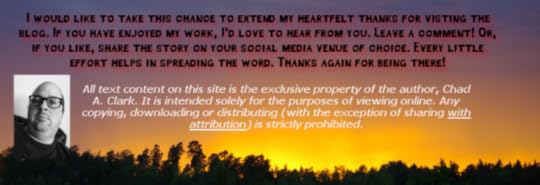Ramblings On The Craft : The Power And Poison of Social Media
.
.
DISCLAIMER : I consider myself to be a life-long writer but I am still an aspiring author. What’s the difference? Essentially, to me anyway, it means that while I have devoted a great deal of time to my words and my art, the amount of money I have made as a professional writer to date could maybe be used to purchase a nice steak dinner for two. So while I have a deep and devoted passion for writing, I do not claim in any way to be an expert or authority figure. What you will find in these essays represent my personal thoughts and feelings about various issues related to writing. I think that in any endeavor, it is essential to have the mindset that there is always something to learn, something you don’t know. As soon as you start to think that you are an authority on anything (besides how to eat a hot dog or perhaps, spelling your name) there might be a problem. With that in mind, I am fully cognizant and comfortable with the fact that on any and all of these issues, I could be completely wrong.
Put another way, I recognize and admit that I could be full of shit.
.
.
In these modern days of publishing, the power of social media can be great indeed. It can be incredibly effective in terms of reaching out and finding people, networking and staying in touch in ways that might not have been possible otherwise. As such however, the great benefits of these tools also have a darker, more destructive side. In a way, it’s sort of like having a drunk uncle who you can call over to the house whenever you need him to fix something. He’ll get your shower head reattached and get it working perfectly, but he’s also likely to end up wrecking your bathroom in the process.
As a fairly new author trying to make his way and get his name out there, I was of course drawn to social media, as “conventional wisdom” tells us that we must use the power of the inter-webs to create the publishing platform and online presence that we need in order to be a success. Being an independently published author means that you have to be willing to roll up your sleeves and go out there onto the digital streets of the world, seeking and obtaining those ever so crucial readers.
In all this time, I have had chance to see both the good and the bad. I tend to believe that social media can be useful for very specific purposes. I also think that you need to have a clear idea going in what your expectations are in terms of what you want. This isn’t like a great, massive Midas fountain in which all you have to do is dip your books into the water and see them come out pure gold.
I’m limiting this discussion pretty much to Facebook as it is the one area of social media I feel most qualified to discuss. I might be marking my age here but while I have been on Twitter, I have never really understood it or gotten the feel of the rhythm of the place. To me, it just feels like standing next to a raging river of content that is constantly flowing past me but never slowing down. I put my stuff out there but I still kind of find myself waiting for that moment when all of my bottles start washing back up on shore.
To start, let me say that I don’t really believe that Facebook can be used that effectively anymore as a platform to try and generate sales. I suppose it can be, if you are willing to pump a ton of money into the financial whirlpool of paid ads, but I would suspect that few of us have the means or ability to make those kinds of investments. And it also seems that the amount of times you find yourself screaming “look at me, buy my book!” often makes you just as much of an annoyance to others as anything else.
So what do I think Facebook is good for? I think that for the purposes of an author trying to find an audience, Facebook is fantastic for developing a support network of other like-minded writers who know your struggle. It can help you connect with both authors and publishers and can be a fantastic tool for networking.
However, that strength comes with a big caveat.
If you are looking to Facebook as a means to help connect with other writers, you need to remember that these relationships are two-way streets. This is not simply a matter of recruiting people who are going to be helping you with your writing career. You have to be willing to make yourself available to them as well. Don’t simply ask them to give you feedback on your book or write a review. Offer to do the same for them. In fact, to be honest I actually find myself offering to help other writers more often than I ask for help myself. I don’t intend that statement to be self-congratulatory but rather, simply, to make the point that we should give more than we receive.The essential thing to remember is that the writers you meet are just people like you, and they will appreciate you all the more if you make an effort to connect with them as people, not as potential resources. Engage with them socially, congratulate and celebrate their accomplishments. Offer what help your busy life will allow. Give up some advice if they ask for it.
DON’T BE A DICK.
And that leads me into much of the bad behavior I see on Facebook. These are writers who are using the tool badly. It comes in the form of people who constantly flood you with requests to buy their book, or to please like their author page, write a review for their books, to do something that will help them gain financially but they never seem to be around to engage your content. They must be so busy with their marketing, I guess.
I see it in the writers groups I have been a part of when authors use the comment threads as a way to beat up less experienced writers with passive-aggressivism and bad advice.
I see it when a writer will use any excuse they can think of to shoehorn a link to one of their books into a conversation. Because you’re all just potential customers, not human beings.
I will freely admit that I am not a best-selling author so it isn’t like I am speaking from experience here. But I really do believe that if you are spending time, sitting around and hatching a strategy for how you are going to be using the Facebook to your advantage, you are wasting your time. Focus on your writing and make it as good as you can. In the meantime, go on on Facebook and introduce yourself to other writers. Talk to them about things other than writing. Talk about movies. Talk about music or food. Talk about their books. In other words, treat them like you would any other friend that you are trying to connect with. If they do end up deciding that they like your writing and want to help spread the word about you, don’t you want that to happen as part of an organic process, as opposed to them caving in to your constant harassment, just to get you to shut up?
I am extremely grateful for the existence of social media. It makes me a little more sympathetic and respectful for authors who cut their teeth in the pre-Internet era, just because it had to have been so much more of a lonely endeavor. To not have any close access to people in your life who understand what you are going through can make this process that much more difficult. So the fact that I can make connections with authors from all over the world makes me very grateful. And not just for the benefits inherent in networking but also for all of the books that I have had the chance to read as a result.
Use Facebook. Use social media. But use it to make yourself a positive part of your writing community. Don’t use it as an extension cord for your nastiness and bullying. You shouldn’t be using social media as a means of getting past other artists, shoving them down into the ground in order to suceed before them. Never ask anything from social media that you aren’t willing to do yourself, even if that means accomplishments and accolades for someone else, before you.
It’s the only way I would ever want to succeed.
.
.
.
.







